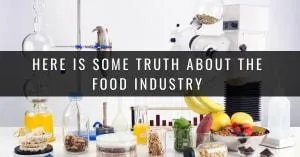WEIGHT LOSS & FITNESS BLOG

My Interview With A Food Scientist
This is a good one! I recently shared an article from Precision Nutrition titled “Manufactured Deliciousness”. If you click that you can read it but I would stay here if I were you! Upon sharing this article, a food scientist I know, had a few comments (politely of course) and allowed me some of her time to discuss some of the issues facing the food industry; as well as the general public when it comes to food, the food industry, and media sensationalism.
Because of the media, I can market this blog like this,
“I went into the belly of the beast of the “food industry” and I came out alive to tell the story!”
Seems accurate right? Netflix documentaries (all pushing an agenda btw) and public media outlets would have us all think that the food industry is “out to get us”. Even in the article I shared from Precision Nutrition, who I respect very highly, they talk about how food companies create their food so that you, the consumer, physically cannot stop eating it. Take a second. Does food control you or do you control your own actions? I would argue that the food companies are simply just trying to put out the best tasting stuff possible so they can do what every business wants to do, be profitable! It’s not a lot different to us investing in our coaches education here at BFP so that we can offer you all the BEST EXPERIENCE POSSIBLE. Sorry, that was a rant on my behalf. Check out the interview with “The Food Industry” below:
Me: The word “Processed” seems to be the most feared word in all of food town. Could you perhaps help our readers understand why and shed some light on what food being processed truly entails:
Food Scientist: This is just being abused as a marketing term in a negative light, when really we all make processed food. We all need to understood that food we make at home is technically considered “processed”. I think it would be better to label this as “manufactured calorie dense foods”. Which you can see why by just reading that phrase, why folks chose to just say “processed foods”. But that’s like saying “I don’t eat carbs”, when folks are trying to say they don’t eat refined white grains but still eat carb rich, organic vegetables. This is a point that I keep trying to convey to family and friends. Not all plant manufactured food is bad. An example I love to give is Stouffers Frozen meals, large batch cooked with no preservatives then frozen. It almost like you made a batch of spaghetti sauce and froze it at home, except you didn’t, someone else did and that’s even better.
Me: As a Food Scientist, where do you see the industry heading as a whole?
Food Scientist: Consumers care more now then they ever have. That’s why the majority % of new product launches and healthy innovation came from start-ups in the last few years and NOT the big brands we all know. It’s an interesting battle going now. The healthy innovation is coming from small companies and the large brands are scrambling to keep up. It’s important to remember where the food industry got its start and how our history has changed the way we eat. For example, the COLD WAR. Everything was about how long can this product stay safe to eat. Everything was saturated in preservatives. But we don’t think like this anymore. Things take time to shift, and it’s shifting.
Me: Wait, so the food industry isn’t just adding weird stuff to our food to get us addicted? Let’s say, specifically, ingredients like MSG?
Food Scientist: I have to say, MSG is the most misunderstood ingredient out there. It’s a salt,a naturally occurring non essential amino acid. There is so much bad research on it. And here we are years later, accepting it back again. I actually pointed out to a friend last night that her favorite chip dip is so delicious for the simple fact it contains MSG. It certainly does make us enjoy the food more. And when I see it on a label, I just know I have to tell myself to stop eating it at a certain point. But’s the same reason I love chicken broth (which has natural glutamate) It enhances flavors in a way that nothing else does. I could literally drink broth all day long, and I’m pretty sure that’s not healthy either. Back 10 years ago there was a industry wide push to remove MSG from everything. So all of these companies would contact my lab and request their products re-formulated without it, and it never tasted the same again. I had to increase sodium typically by 20% to try and enhance the other flavors. And interestingly enough, natural yeast extracts contain glutamate, which is wonderful IMO. Strands of certain yeast are grown for flavor profiles (like beefy, cheesy, fishy) and added to foods to enhance the flavors while being able to lower the sodium. It’s a perfect balance, but this only works because of glutamate. BONE BROTH folks… contains glutamate.
Me: What aspect of the food industry as a whole do you think is leading to most of the misconception?
Food Scientist: I honestly hate marketing. It’s a struggle to find truth. It’s an issue on both sides. The company I work for has a very honest marketing department (thank god). But the heath food industry is just as bad as snack foods. The FDA can not keep up with all the marketing tricks that are out there. Private companies, like GMO Project Verified, get created to try and help with this. But most of the time, they just see a money making business model. The former CEO of Whole Foods has openly admitted this. For example, GMO Project Verified requires companies to pay and get their ingredients certified. Even products that are inherently GMO free by nature. So folks are out there buying the Butterfly label (their company logo) on items that are NOT GMO. But it’s serves a purpose to those that really care about GMO’s. Another example of this trick is Annie’s mac and cheese. And boy do I love it. But if you look closely at the label, there are two different statements. One says made with Organic Ingredient xxx (sometimes it’s the cheese or the macaroni) and the other package says Organic. Both “Organic” words are large on the front of the box, BUT one implies the WHOLE meal is Organic and the other is just the one ingredient. My point being, your GMO-ORGANIC friend is still playing games with you… but the point is to set it apart from say Kraft. All you need is the “Organic’ label on the front to reach for it, regardless of how much of the actual meal is in fact made from all organic ingredients.
Me: If something is made from a natural source, does that make it ok for us to ingest?
Food Scientist: You’re question about natural ingredients is interesting. I don’t think all natural products are appropriate for human digestion. For example, that’s why the industry is fighting over fiber sources right now. The article mentioned above talked about Carboxymethylcellulose (CMC), which is made from birch trees or cotton. It is ground down and then goes through a cleaning process. It is used as a stabilizer and viscosifer in food ingredients. So when I suggest this product to folks, they are typically looking for some thick liquid texture or a product that can help stabilize an emulsion (oil and water mixture). The insoluble fiber that is naturally inherit is what allows the functionality. It is GRAS (generally regarded as safe) and seemingly has no negative health effects. But the name sounds like a chemical, making it seem negative. On a personal level, when I buy foods I look at the label and there are certain things I won’t buy, ever. Like anything that contains inulin. But inulin isn’t unsafe, my body just hates it. So I don’t really think there is an easy answer for this. It just goes along with the, we are all different and react differently idea. Some folks love high fiber no matter what the source.But I am extremely picky about my fiber sources. And I think this is just a good example of Nature Made but I’ll pass.
I hope you were able to gather some truth in an industry that is more convoluted than a general politics discussion. I’ve got more of this from our special guest but this is all I’m giving you right now! See you next week for her take on the food industry as an insider. I think it’s a perspective that you might just appreciate!
Thanks,
Coach Joe


Are you Ready to become
sTRONG - FIT - cONFIDENT?
Click the Button To Start Your Journey Today!!

